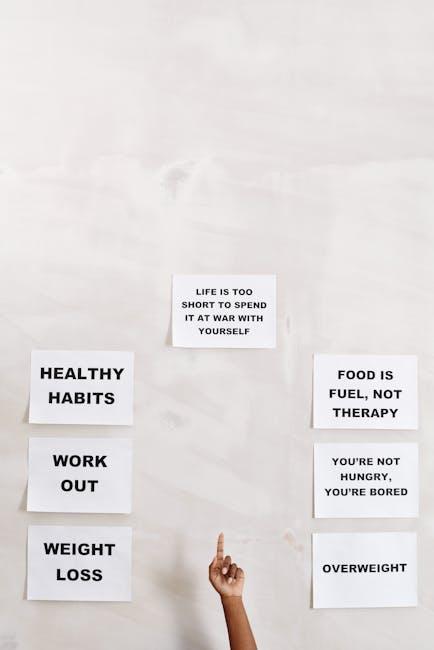In the bustling tapestry of modern life, where the clamor of daily responsibilities often drowns out the subtle whispers of self-care, there lies an understated yet profound connection between what we eat and how we feel. Imagine the mind as a symphony, each thought and emotion a delicate note played by the orchestra of our daily choices. Among these, the food we consume acts as both conductor and performer, wielding the power to influence our mental landscape in ways we are only beginning to understand. “” embarks on an exploration of this intricate relationship, uncovering the science and stories that illuminate how our diets shape not only our bodies but our very perceptions of the world. As we delve into this fascinating interplay, we invite you to consider the plate not just as a vessel for nourishment, but as a canvas for crafting a more balanced and harmonious mind.
Nourishing the Mind: Understanding the Connection Between Diet and Mental Well-being
In recent years, the intricate link between what we eat and how we feel has gained significant attention. It’s fascinating to note that the brain, our most energy-demanding organ, thrives on a balanced diet. Nutrient-rich foods like leafy greens, fatty fish, and berries are not only beneficial for physical health but also play a crucial role in mental well-being. These foods are rich in essential vitamins and minerals, such as omega-3 fatty acids, B vitamins, and antioxidants, which support brain function and emotional balance.
- Omega-3 fatty acids: Found in salmon, walnuts, and flaxseeds, they are known to improve mood and cognitive function.
- B vitamins: Present in whole grains, eggs, and legumes, they help reduce stress and boost energy levels.
- Antioxidants: Berries, dark chocolate, and green tea are rich in these, helping to combat oxidative stress in the brain.
On the other hand, diets high in processed foods and sugars can have the opposite effect, potentially leading to increased anxiety and depression. Understanding this connection empowers individuals to make informed choices about their diet, ultimately fostering a healthier mind and a more fulfilling life.

Mood-Boosting Foods: Exploring Nutrients That Support Emotional Health
When it comes to enhancing emotional well-being through diet, certain nutrients play a pivotal role in uplifting our mood. Foods rich in omega-3 fatty acids, such as salmon, walnuts, and flaxseeds, have been shown to support brain health and may help alleviate symptoms of depression. Similarly, incorporating vitamin D through sources like fortified cereals, mushrooms, or sunlight exposure can enhance serotonin production, a key neurotransmitter linked to mood regulation.
- Leafy Greens: Spinach and kale are packed with folate, which supports the production of dopamine, a feel-good chemical in the brain.
- Fermented Foods: Yogurt, kimchi, and sauerkraut contain probiotics that foster a healthy gut microbiome, potentially reducing anxiety and stress.
- Berries: Blueberries and strawberries are rich in antioxidants that protect the brain from oxidative stress, supporting cognitive function and emotional stability.

The Gut-Brain Axis: How Your Digestive Health Influences Mental Clarity
Our digestive system is more than just a food processing unit; it’s a complex network intricately connected to our brain. This connection, often referred to as the gut-brain axis, plays a crucial role in maintaining mental clarity. A healthy gut can significantly enhance cognitive functions and emotional well-being. This is largely due to the production of neurotransmitters, like serotonin, which are synthesized in the gut and influence our mood and thought processes.
- Microbiome Diversity: A diverse gut microbiome supports a resilient mind. The balance of bacteria can affect anxiety and depression levels.
- Inflammation Control: Reducing gut inflammation can prevent brain fog, allowing for sharper focus and better memory retention.
- Nutrient Absorption: Proper digestion ensures that essential nutrients, like omega-3 fatty acids and B vitamins, support brain health.

Crafting a Balanced Plate: Practical Tips for Enhancing Mental Resilience Through Diet
Creating a well-rounded meal doesn’t just cater to your physical health; it plays a crucial role in supporting mental resilience. A balanced plate is like a well-composed symphony, where each component works in harmony to uplift your mood and enhance cognitive function. Here are some practical tips to help you assemble a nourishing plate:
- Incorporate Omega-3 Fatty Acids: Found in foods like salmon, walnuts, and flaxseeds, these essential fats are known to boost brain function and improve emotional well-being.
- Choose Complex Carbohydrates: Whole grains, such as quinoa and brown rice, provide a steady source of energy, helping to stabilize mood and improve concentration.
- Add a Rainbow of Vegetables: Vibrant veggies like spinach, bell peppers, and carrots are rich in vitamins and antioxidants, which are crucial for reducing inflammation and supporting mental health.
- Prioritize Lean Proteins: Foods like chicken, tofu, and legumes provide the amino acids necessary for neurotransmitter production, key players in mood regulation.
- Don’t Forget Fermented Foods: Yogurt, kimchi, and sauerkraut can promote gut health, which is increasingly linked to mental well-being.
By thoughtfully selecting each element of your meal, you can create a plate that not only satisfies your hunger but also fortifies your mental fortitude.
Closing Remarks
In the vast tapestry of our lives, food is a thread that weaves through our daily existence, coloring our experiences and shaping our well-being. As we’ve explored the intricate relationship between what we consume and how we feel, it becomes evident that our meals are much more than mere sustenance. They are whispers of comfort, echoes of culture, and, perhaps most importantly, powerful allies in nurturing our mental health.
While the journey of understanding this connection is ongoing, one thing remains clear: our choices at the table have the potential to influence the landscapes of our minds. By embracing a diet that honors both body and spirit, we can cultivate a harmony that resonates through every aspect of our being.
As we close this chapter on the impact of food on mental health, let us carry forward the knowledge that every bite holds the promise of change. May our future meals not only nourish our bodies but also feed the vibrant gardens of our minds, where resilience and well-being flourish.


































